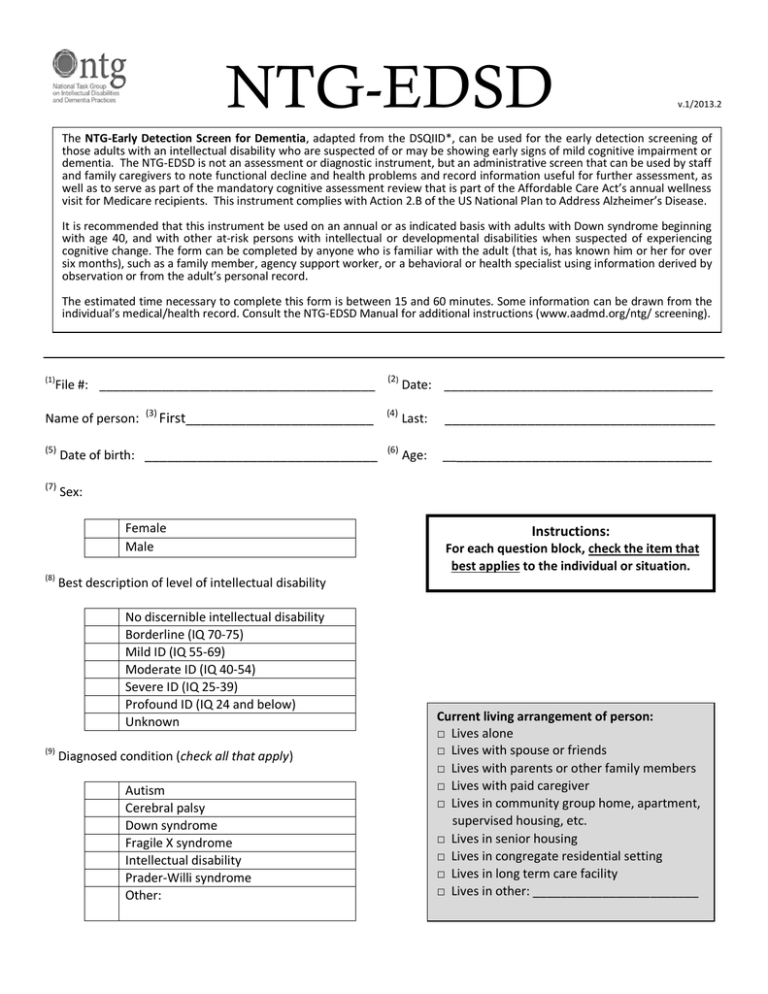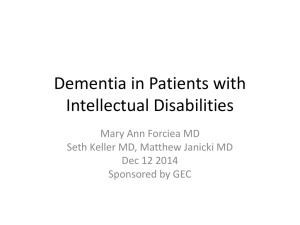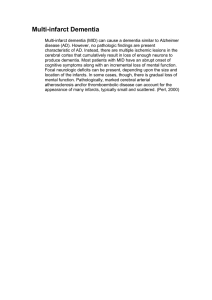NTG-Early Detection Screen for Dementia
advertisement

NTG-EDSD v.1/2013.2 The NTG-Early Detection Screen for Dementia, adapted from the DSQIID*, can be used for the early detection screening of those adults with an intellectual disability who are suspected of or may be showing early signs of mild cognitive impairment or dementia. The NTG-EDSD is not an assessment or diagnostic instrument, but an administrative screen that can be used by staff and family caregivers to note functional decline and health problems and record information useful for further assessment, as well as to serve as part of the mandatory cognitive assessment review that is part of the Affordable Care Act’s annual wellness visit for Medicare recipients. This instrument complies with Action 2.B of the US National Plan to Address Alzheimer’s Disease. It is recommended that this instrument be used on an annual or as indicated basis with adults with Down syndrome beginning with age 40, and with other at-risk persons with intellectual or developmental disabilities when suspected of experiencing cognitive change. The form can be completed by anyone who is familiar with the adult (that is, has known him or her for over six months), such as a family member, agency support worker, or a behavioral or health specialist using information derived by observation or from the adult’s personal record. The estimated time necessary to complete this form is between 15 and 60 minutes. Some information can be drawn from the individual’s medical/health record. Consult the NTG-EDSD Manual for additional instructions (www.aadmd.org/ntg/ screening). (1) File #: ________________________________________ Name of person: (3) First_________________________ (5) Date of birth: _______________________________ (7) Sex: Female Male (8) Date: _______________________________________ (4) Last: ____________________________________ (6) Age: ____________________________________ Instructions: For each question block, check the item that best applies to the individual or situation. Best description of level of intellectual disability No discernible intellectual disability Borderline (IQ 70-75) Mild ID (IQ 55-69) Moderate ID (IQ 40-54) Severe ID (IQ 25-39) Profound ID (IQ 24 and below) Unknown (9) (2) Diagnosed condition (check all that apply) Autism Cerebral palsy Down syndrome Fragile X syndrome Intellectual disability Prader-Willi syndrome Other: Current living arrangement of person: □ Lives alone □ Lives with spouse or friends □ Lives with parents or other family members □ Lives with paid caregiver □ Lives in community group home, apartment, supervised housing, etc. □ Lives in senior housing □ Lives in congregate residential setting □ Lives in long term care facility □ Lives in other: ________________________ NTG-EDSD - page 2 (10) General characterization of current physical health: (15) Seizures Excellent Very good Good Fair Poor (11) Recent onset seizures Long term occurrence of seizures Seizures in childhood, not occurring in adulthood No history of seizures Compared to one year ago, current physical health is: If MCI or dementia is documented complete 16, 17, &18 Much better Somewhat better About the same Somewhat worse Much worse (16) Diagnostic History Mild cognitive impairment [MCI] or dementia previously diagnosed (Dx)?: [ ] No (12) Compared to one year ago, current mental health is: Much better Somewhat better About the same Somewhat worse Much worse (13) Conditions present (check all that apply) Vision impairment Blind (very limited or no vision) Vision corrected by glasses Hearing impairment Deaf (very limited or no hearing) Hearing corrected by hearing aids Mobility impairment Not mobile – uses wheelchair Not mobile – is moved about in wheelchair (14) Significant recent [in past year] life event (check all that apply) Death of someone close Changes in living arrangement, work, or day program Changes in staff close to the person New roommate/housemates Illness or impairment due to accident Adverse reaction to medication or over-medication Interpersonal conflicts Victimization / abuse Other: [ ] Yes, MCI Date of Dx: [ ] Yes, dementia Date of Dx: Type of dementia: Diagnosed by: □ Geriatrician □ Neurologist □ Physician □ Psychiatrist □ Psychologist □ Other: (17) Reported date of onset of MCI/dementia [When suspicion of dementia first arose] Note approximate year and month: (18) Comments / explanations about dementia suspicions: NTG-EDSD - page 3 [Check column option as appropriate] Always been the case (19) Activities of Daily Living Needs help with washing and/or bathing Needs help with dressing Dresses inappropriately (e.g., back to front, incomplete, inadequately for weather) Undresses inappropriately (e.g., in public) Needs help eating (cutting food, mouthful amounts, choking) Needs help using the bathroom (finding, toileting) Incontinent (including occasional accidents) (20) Language & Communication Does not initiate conversation Does not find words Does not follow simple instructions Appears to get lost in middle of conversation Does not read Does not write (including printing own name) (21) Sleep-Wake Change Patterns Excessive sleep (sleeping more) Inadequate sleep (sleeping less) Wakes frequently at night Confused at night Sleeps during the day more than usual Wanders at night Wakes earlier than usual Sleeps later than usual (22) Ambulation Not confident walking over small cracks, lines on the ground, patterned flooring, or uneven surfaces Unsteady walk, loses balance Falls Requires aids to walk Always but worse New symptom in past year Does not apply NTG-EDSD - page 4 Always been the case (23) Memory Does not recognize familiar persons (staff/relatives/friends) Does not remember names of familiar people Does not remember recent events (in past week or less) Does not find way in familiar surroundings Loses track of time (time of day, day of the week, seasons) Loses or misplaces objects Puts familiar things in wrong places Problems with printing or signing own name Problems with learning new tasks or names of new people (24) Behavior and Affect Wanders Withdraws from social activities Withdraws from people Loss of interest in hobbies and activities Seems to go into own world Obsessive or repetitive behavior Hides or hoards objects Does not know what to do with familiar objects Increased impulsivity (touching others, arguing, taking things) Appears uncertain, lacks confidence Appears anxious, agitated, or nervous Appears depressed Shows verbal aggression Shows physical aggression Temper tantrums, uncontrollable crying, shouting Shows lethargy or listlessness Talks to self (25) Adult’s Self-reported Problems Changes in ability to do things Hearing things Seeing things Changes in ‘thinking’ Changes in interests Changes in memory (26) Notable Significant Changes Observed by Others In gait (e.g., stumbling, falling, unsteadiness) In personality (e.g., subdued when was outgoing) In friendliness (e.g., now socially unresponsive) In attentiveness (e.g., misses cues, distracted) In weight (e.g., weight loss or weight gain) In abnormal voluntary movements (head, neck, limbs, trunk) Always but worse New symptom in past year Does not apply NTG-EDSD - page 5 [Check column option as appropriate] (27) Chronic Health Conditions* Recent condition (past year) 1 2 3 4 5 6 7 8 9 10 11 12 13 14 15 16 17 18 19 20 21 22 23 24 25 26 27 28 29 30 31 32 33 34 35 36 37 38 39 40 Condition diagnosed in last 5 years Bone, Joint and Muscle Arthritis Osteoporosis Heart and Circulation Heart condition High cholesterol High blood pressure Low blood pressure Stroke Hormonal Diabetes (type 1 or 2) Thyroid disorder Lungs/breathing Asthma Chronic bronchitis, emphysema Sleep disorder Mental health Alcohol or substance abuse Anxiety disorder Attention deficit disorder Bipolar disorder Dementia/Alzheimer’s disease Depression Eating disorder (anorexia, bulimia) Obsessive-compulsive disorder Schizophrenia Other: Pain / Discomfort Back pain Constipation Foot pain Gastrointestinal pain or discomfort Headaches Hip/knee pain Neck/shoulder pain Sensory Dizziness / vertigo Impaired hearing Impaired vision Other Cancer – type: Chronic fatigue Epilepsy / seizure disorder Heartburn / acid reflux Urinary incontinence Sleep apnea Tics/movement disorder/spasticity Dental pain *Items drawn from the Longitudinal Health and Intellectual Disability Survey (University of Illinois at Chicago) Lifelong condition Condition not present NTG-EDSD - page 6 (28) Current Medications Yes □ □ □ No □ □ □ Indicate type Treatment of chronic conditions Treatment of mental health disorders or behavior problems Treatment of pain For reviews, attach list of current medications, dosage, and when prescribed □ List is attached for reviews (29) (30) Comments related to other notable changes or concerns: Next Steps / Recommendations □ Refer to treating physician for assessment □ Review internally by clinical personnel □ Include in annual review / annual wellness visit □ Repeat in ______ months Form completion information (31) Date completed (32) Organization / Agency Name of person completing form Relationship to individual (staff, relative, assessor, etc.) Date(s) form previously completed Acknowledgement: Derived from the DSQIID (*Dementia Screening Questionnaire for Individuals with Intellectual Disabilities; Deb, S., 2007) as adapted into the Southeast PA Dementia Screening Tool (DST) – with the assistance of Carl V. Tyler, Jr., MD – and the LHIDS (Longitudinal Health and Intellectual Disability Survey; Rimmer & Hsieh, 2010) and as further adapted by the National Task Group on Intellectual Disabilities and Dementia Practices as the NTG Early Detection Screen for Dementia for use in the USA. © AADMD/NTG 1/2013.1 National Task Group on Intellectual Disabilities and Dementia Practices www.aadmd.org/ntg/screening





